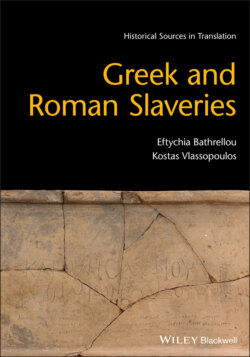Читать книгу Greek and Roman Slaveries - Eftychia Bathrellou - Страница 69
2.19 Menander, Men at Arbitration, 538–49 and 557–66:34 Greek Comedy (End of Fourth/Early Third Century BCE)
ОглавлениеThe interlocutors here are two slaves: Habrotonon, a musician and hetaira working for a pimp, hired temporarily by a young Athenian man, and Onesimos, the valet of that Athenian man. The two are concocting a plan. Habrotonon, whose sexual advances have been rejected by the Athenian, will pretend to be the mother of a baby fathered by him. Then, she will look for the real mother.
Literature: Bathrellou 2012; Cox 2013; Vester 2013.
Onesimos:
But you don’t mention that you will become free. For as soon as he acknowledges you as the child’s mother, he will immediately free you, of course.
Habrotonon: I don’t know. But I’d like it to happen.
Onesimos: Don’t you know?! But what thanks will I get for this, Habrotonon?
Habrotonon: By Demeter and Persephone, I will regard you as the cause of all I might achieve.
Onesimos: But if you stop searching for her on purpose and let it drop, having thus deceived me, what will happen then?
Habrotonon: What for, dear? Do I seem to you to have set my heart upon having children? Just let me become free, gods! May this be my reward!
Onesimos:
I wish you would get it. […]
(Habrotonon exits; Onesimos remains alone on stage.)
Onesimos: The woman is full of ideas. When she saw that it’d be impossible to achieve freedom by the way of love and that she’s struggling in vain, she goes off on a new tack. I, however, will be a slave all my life – driveling me, senseless, completely incapable of planning such things! But, possibly, I will get something from her, if she succeeds. It would be right. How worthless even my calculations are, wretched me, expecting to receive thanks from a woman! Just let me avoid further trouble!
What strategies has Habrotonon used to gain her freedom?
As far as can be judged from this excerpt, is the wish of these two slaves to become free represented in a negative light or sympathetically?
What would the free audience think in hearing this slave dialogue on freedom? Would such a depiction conflict with ideas about the servile and dishonored nature of slaves?
Can we take this passage as a realistic depiction of slave mentalities?
